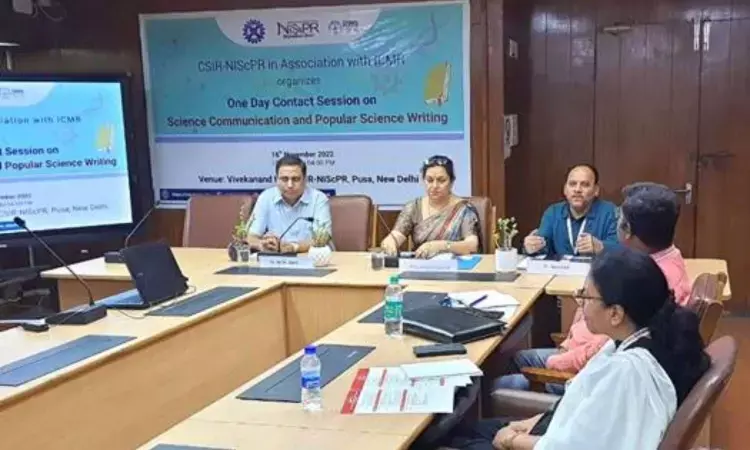- Home
- Medical news & Guidelines
- Anesthesiology
- Cardiology and CTVS
- Critical Care
- Dentistry
- Dermatology
- Diabetes and Endocrinology
- ENT
- Gastroenterology
- Medicine
- Nephrology
- Neurology
- Obstretics-Gynaecology
- Oncology
- Ophthalmology
- Orthopaedics
- Pediatrics-Neonatology
- Psychiatry
- Pulmonology
- Radiology
- Surgery
- Urology
- Laboratory Medicine
- Diet
- Nursing
- Paramedical
- Physiotherapy
- Health news
- Fact Check
- Bone Health Fact Check
- Brain Health Fact Check
- Cancer Related Fact Check
- Child Care Fact Check
- Dental and oral health fact check
- Diabetes and metabolic health fact check
- Diet and Nutrition Fact Check
- Eye and ENT Care Fact Check
- Fitness fact check
- Gut health fact check
- Heart health fact check
- Kidney health fact check
- Medical education fact check
- Men's health fact check
- Respiratory fact check
- Skin and hair care fact check
- Vaccine and Immunization fact check
- Women's health fact check
- AYUSH
- State News
- Andaman and Nicobar Islands
- Andhra Pradesh
- Arunachal Pradesh
- Assam
- Bihar
- Chandigarh
- Chattisgarh
- Dadra and Nagar Haveli
- Daman and Diu
- Delhi
- Goa
- Gujarat
- Haryana
- Himachal Pradesh
- Jammu & Kashmir
- Jharkhand
- Karnataka
- Kerala
- Ladakh
- Lakshadweep
- Madhya Pradesh
- Maharashtra
- Manipur
- Meghalaya
- Mizoram
- Nagaland
- Odisha
- Puducherry
- Punjab
- Rajasthan
- Sikkim
- Tamil Nadu
- Telangana
- Tripura
- Uttar Pradesh
- Uttrakhand
- West Bengal
- Medical Education
- Industry
Contact Session on Health Communication: Scientists should take the responsibility to Communicate Science, says Prof Ranjana

New Delhi: "If scientists don't communicate, non-experts will start communicating and then the cloud of misinformation and disinformation would emerge, therefore it is essential to make our scientists involved in the significant job of science communication". Prof. Ranjana Aggarwal, Director of CSIR-NIScPR (National Institute of Science Communication & Policy Research) shared these thoughts during her inaugural address at the 'Contact Session on Health Communication' organized by CSIR-NIScPR in association with ICMR (Indian Council of Medical Research) on 16 Nov. 2022.
She said, we learnt a lot of lessons from the COVID-19 pandemic in the recent past and we saw how science communication played a very crucial role to eradicate unscientific things during those days of uncertainty. This programme was attended by 30 scientists of various laboratories of ICMR.
Also Read:ICMR calls for research proposals in stillbirths under taskforce programme
A glimpse of the Inaugural function of the Contact Session on Health Communication organized by CSIR-NIScPR in association with ICMR (R-L: Dr. Rajni Kant, Scientist-G, ICMR, Prof. Ranjana Aggarwal, Director, CSIR-NIScPR & Dr. Manish Mohan Gore, Scientist, CSIR-NIScPR)
Dr. Rajni Kant, Scientist-G & Director, ICMR-Regional Medical Research Centre, Gorakhpur was the Guest of Honour of the programme. During the inaugural function, Dr. Kant said that these are 'Super 30' scientists from ICMR laboratories and I am sure they will become proficient science communicators after this course of science communication. He said that ICMR has first initiated a course on Health Communication and it is need of the hour.
Participating scientists of ICMR attending the Contact Session at CSIR-NIScPR
In the first Technical Session at CSIR-NIScPR, four experts delivered lectures on various topics of concern. Shri R.S. Jayasomu, Chief Scientist, CSIR-NIScPR delivered a lecture on 'Research Communication vs. Science Communication: Need of the Hour". The topic of the talk of Dr. Y. Madhavi, Chief Scientist, CSIR-NIScPR was 'Health Communication in Post Covid Era'. Dr. Manish Mohan Gore, Scientist, CSIR-NIScPR presented his talk on 'Popular Science Writing for Different Media'. Shri Ashwani Brahmi, Principal Technical Officer, CSIR-NIScPR discussed know-how of production and printing in science communication with the participating scientists of ICMR.
After the first technical session, all the participants visited the scientific facilities of CSIR-NIScPR. During this visit, all the participants of the programme went through the Printing Unit-machineries, Ayur Vatika of medicinal plants, and Herbarium of raw materials based on plants, animals and minerals. CSIR-NIScPR is one of the constituent laboratories of CSIR with the two key mandates of STI-based policy studies-research and science communication. NIScPR brings out 16 peer-reviewed open access journals in various prominent disciplines of S&T. Three most popular science magazines of the country are published from CSIR-NIScPR. These magazines are Science Reporter (in English), Vigyan Pragati (in Hindi) and Science ki Duniya (in Urdu).
During second Technical Session, three experts delivered lectures. Senior Science Communicator and Photo journalist Shri Pallav Bagla interacted with participants about the 'Clever ways of communicating science'. Dr. Paramananda Barman, Scientist, CSIR-NIScPR presented his talk on 'SVASTIK and its Media Coverage Insights' focused on the scientific validation of Indian traditional knowledge. The theme of the lecture of Dr. Meher Wan, Scientist, CSIR-NIScPR was 'How to communicate your research to the general public'.
All the participating scientists of ICMR labs learnt a lot from the inspirational talks of the experts of both sessions. It was also planned that every participant will write a popular science article on his/her area of expertise and submit to CSIR-NIScPR for publishing purpose in Science Reporter and Vigyan Pragati (Popular Science Magazines of CSIR-NIScPR). At the end of the programme, Dr. Enna Dogra and Dr. Priya, Scientists of ICMR coordinated the feedback and takeaway session. Dr. Manish Mohan Gore, Scientist, CSIR-NIScPR proposed vote of thanks. Ms. Shubhada Kapil, Technical Assistant, CSIR-NIScPR compared the whole programme.
Kajal Rajput joined Medical Dialogues as an Correspondent for the Latest Health News Section in 2019. She holds a Bachelor's degree in Arts from University of Delhi. She manly covers all the updates in health news, hospitals, doctors news, government policies and Health Ministry. She can be contacted at editorial@medicaldialogues.in Contact no. 011-43720751


